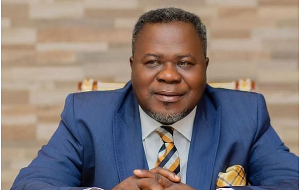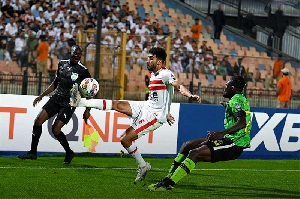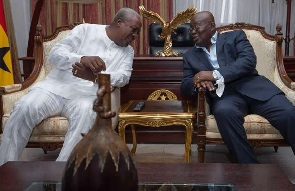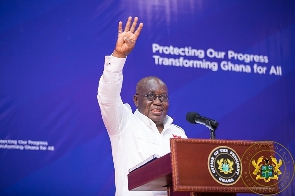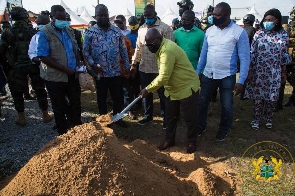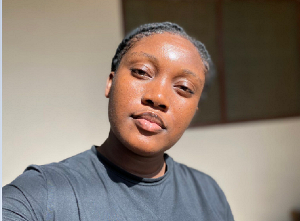Kumasi (Ashanti), 14th May ?99 ?
The University of Science and Technology (UST) Council accepted the report submitted to it
by the Search Committee set up by the council to interview applicants for the post of a vice-chancellor to the UST as a working document.
Mr Yaw Attakora-Amoo, counsel for Professor Albert Owusu-Sarpong, Dean of the Faculty of Social Sciences of the UST, last Wednesday told a Kumasi High Court presided over by Mr Gilbert Mensah Quaye, that there is no evidence to show that the report was rejected by the council.
Mr Attakora-Amoo was addressing the court in the case in which Prof. Owusu-Sarpong is seeking a declaration by the court to enforce the UST and the UST Council's convention for the appointment of a vice-chancellor.
He said the council set up the committee with the mandate to interview applicants for the post of a vice-chancellor, short-list and rank them in order of merit for the consideration of the council.
The plaintiff's counsel said the committee under the chairmanship of the Right Reverend Emeritus Prof. K.A.
Dickson in its report submitted to the council on June 6, 1998, stated that "at the end of an exhaustive process, it ranked the applicants in order of merit" and his client was first in order of merit.
Mr Attakora-Amoo said at the 158th special meeting of the council held on August 31, 1998, the main agenda was the appointment of a vice-chancellor and it was at this meeting that the chairman of the Search Committee was invited to submit his report.
He said evidence before the court indicates that when the chairman of the Search Committee presented the report, he was grilled and asked all manner of questions by members of the council. After the chairman had left, members of the council were given sufficient time to read the report that was given to them at that meeting.
Mr Attakora-Amoo said after members of the council had read through the report, Mr S.K. Boadi moved for its acceptance as a working document and was seconded by Mr Letsu Dake.
Mr Attakora-Amoo said there is evidence before the court that some members of the council had proposed voting on the three short-listed candidates basing their assessments on the application forms, curriculum vitae (CV), write-ups and referees' reports supplied to members of the council by the registry of the UST.
Counsel said there would be evidence to show that this was out of tune with the normal practice.
He said it was his view that the real issue in the matter began from the deliberations by the members of the council after the chairman of the search committee had left.
Counsel said some members of the council purporting to discern inadequacies in the report were bent on voting to pick on one of the three candidates, while some members were of the view that voting was uncalled for and that the appointment of a vice-chancellor should be based on the report which unequivocally states who was first in order of merit.
"To them there was no question or issue as to who was first in order of merit and (there was) no need for voting", he added.
Mr Attakora-Amoo said his client avers that the council has a constitutional duty to appoint a vice-chancellor and in exercising its power by the constitution, is subject to provisions and other articles particularly article 23 and 296.
He maintained that the council is subject to any existing law and regulations that are not in conflict with any provisions of the constitution, where the council had agreed to follow an earlier precedent and convention in the appointment of a vice chancellor.
Counsel said where the council has set in motion that machinery and where the council in its own beliefs and assertions has stated that the machinery set in place was an improvement on an earlier one set up by another council, then it would be a breach of the constitutional provisions for the council to hide behind the concept of absolute discretion under which it thinks it can change the procedure on grounds of what they term as disagreement over the report.
Mr Attakora-Amoo said the court has the constitutional jurisdiction to scrutunise the behaviour of the members of the council to ascertain whether the powers vested in it are being used properly.
Mr Attakora-Amoo told the court that the council by its resolution 666 adopted at its 86th meeting held on November two, 1979, regulated the appointment of heads of departments who had reached the retiring age and this was applicable to the vice-chancellor.
He said the council cannot appoint someone who is over 60 years to hold the post of a vice-chancellor. In addition, the council's powers are limited since it cannot appoint someone who could not hold the tenure of office whether for four or five years before he reaches the age of 60.
Counsel said at the 157th meeting of the council held on April 17, 1998, it was decided that the tenure of office of the Vice-chancellor should be five years and not four years which was not stated in the advertisements for the appointment of a vice-chancellor.
He said any applicant who cannot hold the post for five years was legally disqualified and it cannot be an issue of a candidate being made to suffer because of the mistake of the UST registry.
Mr Attakora-Amoo said the report by the committee stated that candidates were not informed that the tenure of office was five years and not four years and a matter of their disqualification.
He said when the council became aware that the proper tenure of office was five years, it will be illegal and contrary to the constitution for the council at that stage to consider those people who at that time of appointment cannot hold office for a minimum of the correct years of tenure from the date of appointment before their retirement.
Counsel submitted that assuming the powers given to the council are discretionary they are subject to some provisions of the constitution and it is doubtful if even the powers given to them are discretional because discretion lies in the question of procedure to be followed.
He said in the use of administrative powers by the council as enshrined in the constitution, the circumstances of the case before the court dictates whether the decision taken by the council was fair, reasonable, impartial and transparent in their action.
Mr Attakora-Amoo said the UST is a national asset which belongs to the entire community and does not belong to the UST Council or its members to confer privilege on a Ghanaian who had applied to the post of a vice-chancellor.
The case was adjourned to Monday, May 17.

